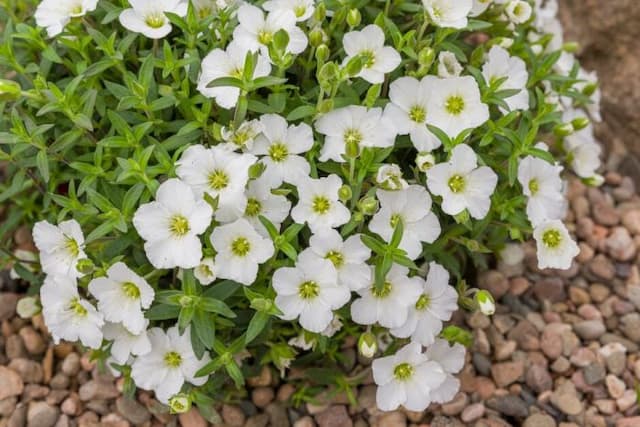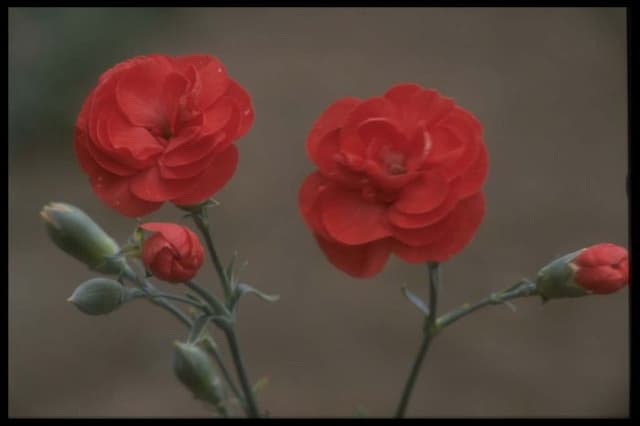Sweet William Dianthus 'Bryony Lisa' (b)

ABOUT
The Dianthus 'Bryony Lisa' is a captivating perennial plant with an array of vibrant and eye-catching qualities. It features a dense mat of slender grey-green foliage, from which stems arise bearing strikingly beautiful flowers that command attention. The blooms, characteristically frilly along the edges, display a unique pattern of coloration. Each blossom is adorned with a rich, deep pink hue that often darkens towards the center, creating an alluring contrast against the lighter petals edges. The petals themselves may exhibit a delicate pattern resembling a lacy effect, with a subtle, deeper pink hue occasionally bordering each petal, giving them a pronounced outline and adding definition to the flower's form. In the center of these blooms, you'll find a tight cluster of small stamens that may vary from light to deep pink, providing a focal point that draws both the eye and various pollinators. Overall, Dianthus 'Bryony Lisa' exudes charm and can add a touch of vibrant color and alluring fragrance to any garden, as the blossoms often carry a sweet, spicy scent that is typically associated with dianthus varieties. The plant presents itself as a neat, compact clump, making it a suitable choice for borders and rock gardens where its colorful and fragrant display can be appreciated up close.
About this plant
 Names
NamesFamily
Caryophyllaceae
Synonyms
Sweet William, Pinks
Common names
Dianthus 'Bryony Lisa'
 Toxicity
ToxicityTo humans
Dianthus 'Bryony Lisa', commonly known as Carnation, is not generally considered toxic to humans. If ingested, it might cause mild gastrointestinal discomfort, but serious poisoning is rare. Nonetheless, sensitivity varies from person to person, and some may experience a more adverse reaction than others. If any part of the plant is ingested in significant quantities and symptoms develop, it is advisable to seek medical attention.
To pets
Carnations are mildly toxic to pets. If a pet ingests a part of a Carnation plant, they could experience mild gastrointestinal signs including vomiting, diarrhea, or drooling. These symptoms are typically not severe, but it’s always wise to monitor the pet and consult a veterinarian if the pet displays signs of distress after ingestion. It is best to keep Carnations out of reach of pets to avoid any potential issues.
 Characteristics
CharacteristicsLife cycle
Perennials
Foliage type
Evergreen
Color of leaves
Green
Flower color
Pink
Height
10 inches (25 cm)
Spread
12 inches (30 cm)
Plant type
Herb
Hardiness zones
5
Native area
Europe
Benefits
 General Benefits
General Benefits- Aesthetic Appeal: The Dianthus 'Bryony Lisa' adds vibrant color and beauty to gardens with its striking flowers.
- Low Maintenance: Once established, it requires minimal care, making it ideal for busy gardeners or those new to gardening.
- Attracts Pollinators: The blooms attract bees and butterflies, which are essential for pollination and a healthy ecosystem.
- Drought Tolerance: It is relatively drought-resistant, making it suitable for xeriscaping and water-conscious gardening.
- Versatility: Suitable for planting in containers, borders, and as part of a rock garden, offering various landscaping uses.
- Lifespan: Being a perennial, it can provide visual interest for several years with proper care.
- Fragrance: The flowers of Dianthus often emit a pleasant fragrance, which can enhance the sensory experience of a garden.
- Cut Flowers: They make excellent cut flowers, allowing you to enjoy their beauty indoors in floral arrangements.
- Ground Cover: Dense foliage can help suppress weeds and cover bare spots in the landscape.
- Cold Hardy: It can withstand cooler temperatures, making it suitable for various climates.
 Medical Properties
Medical PropertiesThis plant is not used for medical purposes.
 Air-purifying Qualities
Air-purifying QualitiesThis plant is not specifically known for air purifying qualities.
 Other Uses
Other Uses- Edible Decoration: The flowers of the 'Sweet William' can add a vibrant touch to salads and desserts as an edible garnish.
- Aromatherapy: The scent of Sweet William can be used in potpourri or sachets to naturally freshen up the home and provide a mild and pleasant aroma.
- Bio-coloring Agent: The petals can be used to create natural dyes for fabrics or inks, providing a range of pink to red hues.
- Culinary Infusions: Sweet William petals can be infused into syrups or vinegars to add floral notes to cocktails or cooking recipes.
- Pressed Flower Crafts: The blossoms can be pressed and used for creating bookmarks, greetings cards, or other decorative paper crafts.
- Floral Ice Cubes: Freeze the flowers into ice cubes to create an attractive and unusual touch for summer drinks.
- Soap Making: Incorporate the petals into homemade soaps for their fragrance and for decorative purposes.
- Flower Arranging: The long-lasting nature and vivid colors make Sweet William a popular choice for fresh and dried floral arrangements.
- Natural Pest Deterrent: Plant Sweet William in gardens as they are known to repel certain insects due to their fragrance.
- Photography Subjects: Their distinctive patterns and colors make them exquisite subjects for botanical or artistic photography.
Interesting Facts
 Feng Shui
Feng ShuiThe Carnation is not used in Feng Shui practice.
 Zodiac Sign Compitability
Zodiac Sign CompitabilityThe Carnation is not used in astrology practice.
 Plant Symbolism
Plant Symbolism- Passion: The rich, vibrant colors of the Carnation often symbolize deep feelings and passion, making it a common gift for romantic occasions.
- Love: Carnations are traditionally associated with love and fascination, with different colors representing different kinds of love.
- Distinction: Known for their unique texture and long-lasting flowers, Carnations stand for the uniqueness and pride of the individual.
- Mother's Love: Particularly pink Carnations are said to symbolize a mother's undying love, often associated with Mother's Day.
- Divine Love: In Christian symbolism, Carnations are believed to have first appeared from the Virgin Mary's tears, representing divine love and sacrifice.
 Water
WaterThe Sweet William should be watered thoroughly, ensuring that the soil is kept evenly moist but not water-sodden. Generally, watering once a week with approximately 1-2 gallons per plant should suffice, although this can vary depending on climate and soil conditions. During hot spells or drought, you may need to water Sweet Williams more frequently, possibly every 3-4 days, taking care not to let the soil dry out completely. It is important to water at the base of the plant to avoid wetting the foliage, which can lead to fungal diseases.
 Light
LightSweet William thrives in full sun, needing at least 6 to 8 hours of direct sunlight each day. The ideal spot for planting would be a location that receives morning sun and some partial shade during the hottest part of the afternoon. Avoid deeply shaded areas as inadequate light can impede blooming and result in a leggy plant.
 Temperature
TemperatureSweet William prefers cool to mild temperatures, with optimal growth occurring between 60 - 70°F. While they can tolerate temperatures down to about 20°F, they may not survive extreme cold without protection. Similarly, high temperatures above 80°F can stress the plants, especially if night temperatures remain high.
 Pruning
PruningPruning Sweet William is important to encourage bushier growth and more blooms. Deadheading, or the removal of spent flowers, should be done regularly to prolong blooming. At the end of the blooming season, typically late summer or fall, prune back the plant to about 5 inches to maintain shape and prepare it for the next blooming cycle.
 Cleaning
CleaningAs needed
 Soil
SoilThe best soil mix for the Carnation 'Bryony Lisa' is well-draining, loamy soil with a neutral to slightly alkaline pH between 6.5 and 7.5. Amend the soil with compost or well-rotted manure to improve drainage and fertility.
 Repotting
RepottingCarnations 'Bryony Lisa' should be repotted every one to two years or when the plant has outgrown its current container. This will provide fresh nutrients and encourage healthy growth.
 Humidity & Misting
Humidity & MistingCarnations 'Bryony Lisa' prefer moderate humidity levels. They can tolerate some dry air but will thrive better with some moisture in the air.
 Suitable locations
Suitable locationsIndoor
Place in a sunny spot with good air flow.
Outdoor
Plant in sunny location with well-draining soil.
Hardiness zone
3-9 USDA
 Life cycle
Life cycleDianthus 'Bryony Lisa', commonly known as Carnation or Pink, begins its life cycle as a seed that requires well-draining soil and light for optimal germination. After germination, the seedling rapidly develops a root system and foliage in the form of a basal rosette. The vegetative stage is characterized by the growth of dense, blue-green leaves and the plant increasing in size and strength, preparing for flowering. The reproductive stage is marked by the emergence of long-lasting, fragrant flowers, typically in late spring to early summer, which can come in various colors and are sought after for their ornamental value. Following pollination, which can be facilitated by insects, the plant sets seed, enabling propagation and the continuation of the life cycle. After the blooming period, the plant may enter a period of dormancy, especially in colder climates, before resuming growth in the next season.
 Propogation
PropogationPropogation time
Spring-Early Summer
Carnation 'Bryony Lisa' can be propagated using the most popular method, which is by cuttings. The best time to take cuttings is in late spring to early summer when the plant is actively growing. Select healthy, non-flowering stems and make a cut approximately 4-6 inches (10-15 cm) long just below a leaf node. Remove the leaves from the lower half of the cutting and dip the cut end into rooting hormone powder to encourage root growth. Next, insert the cut end into a moist potting mix, perlite, or vermiculite ensuring at least two sets of leaf nodes are below the surface. The cuttings should be placed in a well-lit area but out of direct sunlight and kept consistently moist. Roots typically develop within 2-3 weeks, after which the new plants can be transferred to individual pots to continue growing.


![Pink [Tequila Sunrise]](/_next/image?url=https%3A%2F%2Fplants-admin.emdemapps.com%2Fimages%2Fplants%2F%2Fimages%2F604b5d995d06e.png&w=640&q=75)






